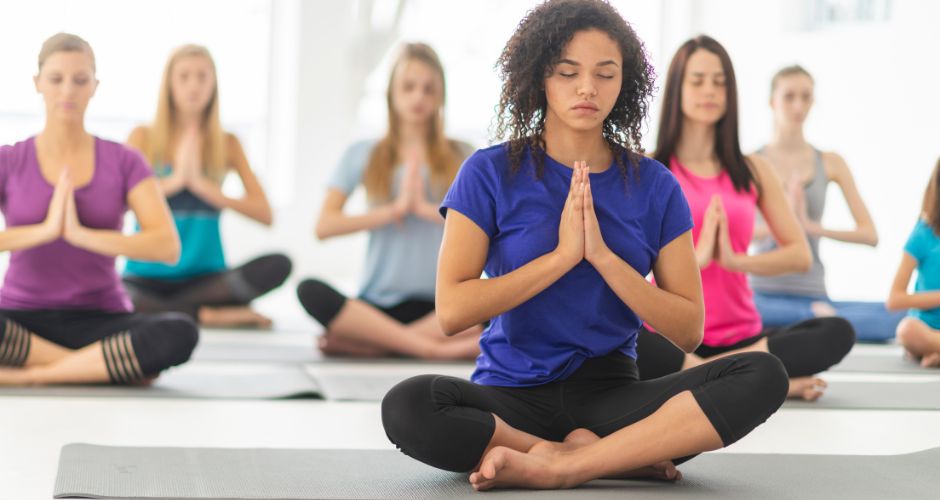Top Benefits of Yoga for Physical and Mental Health

In a world where the pace of life seems to quicken with each passing day, finding a holistic approach to nurture both our physical and mental well-being becomes increasingly essential. Enter yoga, a time-honored practice that transcends the realms of mere exercise, offering a comprehensive journey towards vitality and tranquility.
As we unroll our mats and delve into the harmonious world of yoga, let’s explore the myriad ways in which this ancient discipline enriches our lives, promoting not only physical strength and flexibility but also mental clarity and emotional resilience.
Benefits of Yoga for Physical Health
With its roots deeply embedded in ancient traditions, yoga has emerged as a powerful tool for promoting physical health in the modern world. Beyond its spiritual and meditative aspects, yoga offers many tangible bodily benefits. Let’s explore how incorporating yoga into your routine improves physical well-being.
- Increased Flexibility: Yoga’s emphasis on stretching and holding various poses enhances flexibility. Over time, regular practice can lead to improved range of motion in joints and muscles, reducing stiffness and promoting a more agile body.
- Enhanced Strength: The diverse range of yoga poses engages various muscle groups, contributing to overall strength development. Holding poses and transitioning between them builds muscle endurance, fostering a more robust and resilient physique.
- Improved Posture: Yoga encourages awareness of body alignment and helps in developing better posture. Strengthening the core muscles and promoting spine flexibility contribute to an upright and well-supported posture in everyday activities.

- Better Balance: Balancing poses in yoga challenge stability and proprioception, enhancing overall balance. Improved balance reduces the risk of falls and promotes coordination and greater physical confidence.
- Joint Health: Many yoga poses’ gentle, low-impact nature is particularly beneficial for joint health. Regular practice can help lubricate joints, alleviate stiffness, and mitigate arthritis-related issues.
- Cardiovascular Health: Certain styles of yoga, such as Vinyasa or Power Yoga, incorporate dynamic sequences that elevate the heart rate. This cardiovascular aspect of yoga improves blood circulation, heart health, and overall cardiovascular fitness.
- Respiratory Benefits: Yoga strongly emphasizes controlled breathing (pranayama), enhancing respiratory function. Deep, intentional breaths improve lung capacity, oxygenate the body, and promote better respiratory efficiency.
- Muscle Tone and Definition: Yoga’s varied movements and poses target different muscle groups, promoting muscle toning and definition. This contributes to a leaner and more sculpted physique.
- Pain Relief: Yoga has been recognized for its potential in managing and alleviating chronic pain. The combination of gentle stretching, strengthening, and mindfulness can provide relief from conditions like back pain, helping individuals manage discomfort more effectively.
- Weight Management: The physical activity of yoga and its mindfulness can support weight management goals. Yoga promotes a holistic approach to well-being, fostering a healthy relationship between the body and mind.
Benefits of Yoga for Mental Health
In the quest for holistic well-being, yoga extends beyond physical fitness, offering profound benefits for mental health. Rooted in ancient traditions, yoga provides a unique combination of mindfulness, breath control, and movement that can positively impact various aspects of mental well-being. Let’s delve into the mental health benefits that make yoga a powerful tool for promoting emotional balance and psychological resilience.
- Stress Reduction: One of yoga’s primary mental health benefits is its ability to alleviate stress. The mindful breathing and relaxation techniques employed in yoga activate the body’s relaxation response, reducing the levels of stress hormones and fostering a sense of calmness.
- Anxiety Management: Yoga offers effective strategies for managing anxiety. Mindful practices, such as meditation and focused breathing, help individuals become more attuned to the present moment, reducing anxious thoughts and promoting a state of tranquillity.
- Enhanced Emotional Regulation: Regular yoga practice encourages emotional awareness and mindfulness. By connecting with one’s emotions on the mat, individuals can develop better emotional regulation skills, leading to greater resilience in facing life’s challenges.
- Improved Mood: Combining physical activity, breath control, and mindfulness in yoga has been linked to improved mood. The release of endorphins during exercise, coupled with the calming effects of mindfulness, contributes to an uplifted and positive mental state.
- Mind-Body Connection: Yoga emphasizes the connection between the body and mind. Through various poses and breathing techniques, practitioners cultivate a heightened awareness of the mind-body relationship, promoting a more profound understanding of their mental and physical states.
- Cognitive Function: Yoga has been associated with enhanced cognitive function. The focus required during practice and mindfulness techniques can improve attention, memory, and overall cognitive abilities, contributing to mental sharpness.
- Quality Sleep: The relaxation-inducing effects of yoga can positively impact sleep quality. Practicing yoga before bedtime promotes a sense of calmness, making it easier for individuals to unwind and enjoy a more restful night’s sleep.
- Mindfulness and Presence: Yoga encourages living in the present moment. Mindfulness practices integrated into yoga sessions train individuals to be fully present, reducing reflective thoughts about the past or future and promoting mental clarity.
- Coping with Depression: Yoga has shown promise in complementing traditional therapies for managing depression. Combining physical activity, breath awareness, and mindfulness can contribute to a more balanced emotional state.
- Self-Reflection and Mindful Living: Yoga provides a space for self-reflection. As individuals engage in the practice, they develop greater self-awareness, fostering a mindful approach to daily life and promoting overall mental well-being.
Including yoga in your daily practice can lead to a profound improvement in both your physical and mental well-being. This age-old practice’s holistic qualities not only improve physical health but also mental toughness, emotional stability, and a deep sense of equilibrium amid the chaos of contemporary life. Accept the mat and discover all of the advantages that yoga provides for a happier, healthier life.
Recommended – HIIT Workouts for Beginners at Home






